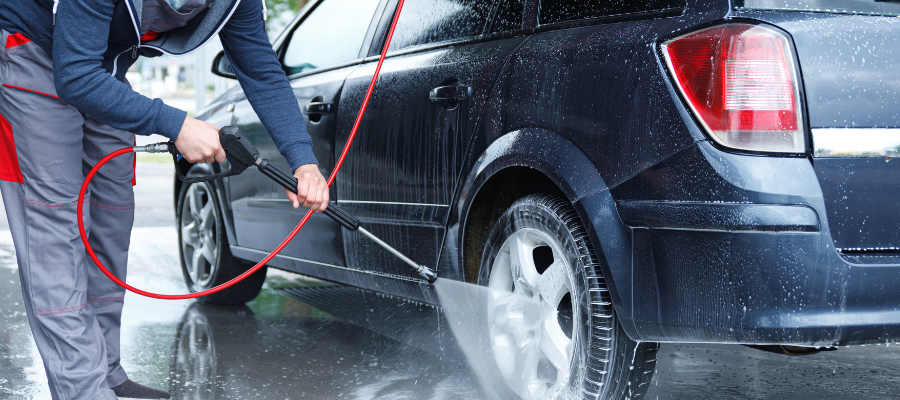With UK drivers spending over £600 million on on-demand car cleaning in 2024, now is the perfect time to start a mobile valeting business.
That said, launching any business can be stressful and time-consuming, especially if you don’t have any experience.
In this post, I’ll walk you through the complete process of starting a mobile valeting business, step by step. From researching the market and choosing a name to buying equipment and promoting your services, this is the most comprehensive guide you’ll find anywhere online.
Overview
- Research the market: Identify competitors, check local demand, and review pricing to establish whether you can successfully enter the market. Learn more.
- Create a business plan: Draft a business plan detailing your expenses, pricing, projected profits, service areas, and target market. Learn more.
- Pick a legal structure: Decide if you want to operate your mobile valeting business as a sole trader or a company. Learn more.
- Choose a brand name: Create a memorable brand name, confirm it’s availability, and quickly secure the domain and social media handles. Learn more.
- Buy equipment and supplies: Purchase the tools and supplies you need to run your mobile valeting business including a pressure washer, vacuum, and cleaning products. Learn more.
- Get insurance: Identify the types of insurance you need, such as Public Liability Insurance, to protect both your company and your customers. Learn more.
- Start marketing: Use social media, a simple website, online ads, and offline advertising like flyers, local radio, and community boards to reach new customers. Learn more.
- Get reviews: Encourage customers to leave reviews on your website, social pages, platforms like Trustpilot, and online directories. Learn more.
- Build a portfolio: Take photos or videos of complete jobs and share them on your website, social media, and online profiles. Learn more.
- Manage the business: Keep accurate records, provide excellent customer service, and learn how to schedule bookings efficiently. Learn more.
- Stay motivated: Learn techniques to stay motivated and consistent with marketing and growing your business. Learn more.
Step One: Research the market
- Research local demand, pricing, and competition before starting a mobile valeting business.
- Review competitors’ websites, social media, and platforms like Trustpilot for activity and reviews.
- Compare their prices and services to decide how to compete or add value.
Before you start a mobile valeting business, it’s important to do some market research. This process involves checking local demand, pricing, and competition.

Search for other mobile valeters operating in your area. Check their website, social pages, review sites like Trustpilot, and profiles on directories. The number of reviews, followers, and comments is a clear indication of their popularity.
It’s also a good idea to research the services and prices of other valeters. Think about whether you can match their prices, beat them, or provide more value for money.
Step Two: Create a business plan
- Write a business plan outlining services, target market, pricing, marketing, and financial goals.
- Set competitive prices and packages by calculating expenses and desiered profit margins.
- Define opening times, coverage areas, and target customers to guide operations and costs.
- Include a clear marketing strategy to attract and retain customers.
Once you’ve determined the demand for a mobile valeting service in your area, it’s time to create a business plan. A business plan is a written document that sets out the roadmap for starting and growing your company. It’s essential to create a business plan if you want to attract lenders or investors.
Start with a summary
Your business plan should start with a summary that captures the essence of your mobile valeting company. List the services you plan to offer, your target market, pricing strategy, and marketing plan. You should also include a mission statement, a brief description of your unique selling points, and an overview of your financial goals or funding needs. This section acts as a snapshot of the plan, allowing for a quick understanding of your business at a glance.
Calculate prices and packages
Decide on the packages you want to offer (basic wash, exterior valet, full valet), and calculate prices based on your expenses (travel, supplies, equipment costs). You can also look at other valeters in your area to get an idea of how much they charge.
It’s important to set competitive prices while also aiming for healthy profit. For example, if a basic valet costs you £10 in expenses and takes 30 minutes to complete, charge around £20-£30 for the service. Take everything into consideration when calculating prices including fuel, water, electricity, and cleaning products.
Decide on opening times
Will you operate Monday-Friday, seven days a week, or only on weekends? What hours will you be available each day? These scheduling details belong in your business plan, as they help define your capacity, staffing needs, and the level of service customers can expect.
Choose coverage areas
The more areas you cover, the more customers you will reach. Start with a base area like your main town or city, and calculate the fuel costs to cover other nearby towns or cities.
Typically, most valeters cover a 10-15 mile radius, but this depends on the type of vehicle they use and it’s fuel efficiency. You can check the latest fuel prices and use a free mileage calculator to estimate the cost of travelling to different areas.
Determine your target market
Another vital aspect of your business plan is determining your target market. Do you aim to serve busy professionals, luxury car owners, or business fleets? What is the size of the local customer base, meaning how many car owners live nearby? Understanding your target market is the first step to reaching it.
Create a marketing strategy
Creating a detailed marketing plan is another key part of your business plan. Discuss how you intent to attract customers, whether through social media, paid advertising, or offline methods such as flyers and billboards. You’ll find more guidance on promoting your business later in this guide, under the ‘Start Marketing’ section. Just include some key strategies in your business plan.
Step Three: Pick a legal structure
- Choose a legal structure: operate as a sole trader or register as a limited company.
- Sole trader is simplest, requiring only an annual self-assessment tax return if earnings exceed £1000.
- Consider consulting an accountant for advice and keep detailed records of income and expenses.
The next step toward starting a mobile valeting business is to decide on the legal structure of the business. In the UK, you can either operate as a sole trader or register as a company.

Both options have their pros and cons. However, if you’re just starting out and plan to operate the business alone, it’s recommended to register as a sole trader. There are less documents to complete as a sole trader, and you only need to complete a self-assessment tax return once a year. This is when you declare your earnings to HMRC and pay any tax on profits.
You’re legally required to register as a sole trader if your earnings exceed £1000 in a given tax year. It’s fairly easy to register as a sole trader online through the government’s website.
During this step, you may want to seek the advice of an accountant. They will help you to pick the best legal structure based on your individual needs, whether that be registering as a sole trader or a limited company. There is a wide range of free resources and guides online to help you through the process.
Quick Tip: It’s essential to keep track of income and expenses when running a business in the UK. This includes keeping receipts and lodging revenue and profits. You can do this yourself or you can hire an accountant. More on this will be discussed later, in the ‘Manage the business’ section.
Step Four: Choose a brand name
- Pick a short, catchy, and unique name to avoid trademark issues.
- Brainstorm ideas using tools like Namelix or by researching other valeting brands.
- Check availability with Google, domain searches, and trademark checks.
- Secure the name by registering the domain and social media handles early.
Choosing a good brand name is essential when starting a mobile valeting business. It needs to be short, catchy, and memorable. It should also be unique and original, otherwise you risk running into trademark or copyright issues.
Create a list of ideas
Start by making a list of potential names. Free tools like Namelix or AI chatbots can help spark creative ideas. You can also look at the names of other valeting brands for inspiration.
Check availability
Once you have a list of ideas, check if they’re available by Googling them, seeing if the domain is taken, and running a trademark search. You can also use sites like BrandSnag to see if a name is already in use across platforms like Facebook, YouTube, and TikTok.
Avoid using any name that sounds similar to an existing business, especially if they serve the same market. It’s best to choose something that’s completely unique.
Secure the name
After finding a winner, secure the name as soon as possible be registering the domain, opening social accounts, and protecting it legally when necessary. Even if you don’t plan to build a website or create social pages right away, you should still buy the domain and register the usernames so others can’t take them.
Step Five: Buy equipment and supplies
- Start with basics: pressure washer, water tank, sponges, buckets, car shampoo, glass and all-purpose cleaner, plus a vehicle to carry equipment.
- Upgrade with vacuum, steam cleaner, air dryer, and specialist brushes or microfiber clothes for premium services.
- Buy equipment new or second-hand from retailers, marketplaces like Gumtree/eBay, or even full starter kits from existing businesses.
- Source cleaning products from dedicated valeting suppliers and shop around for the best prices.
You’ve done market research, created a business plan, and come up with a brand name. Now, it’s time to get the equipment and supplies you need to run a mobile valeting business.
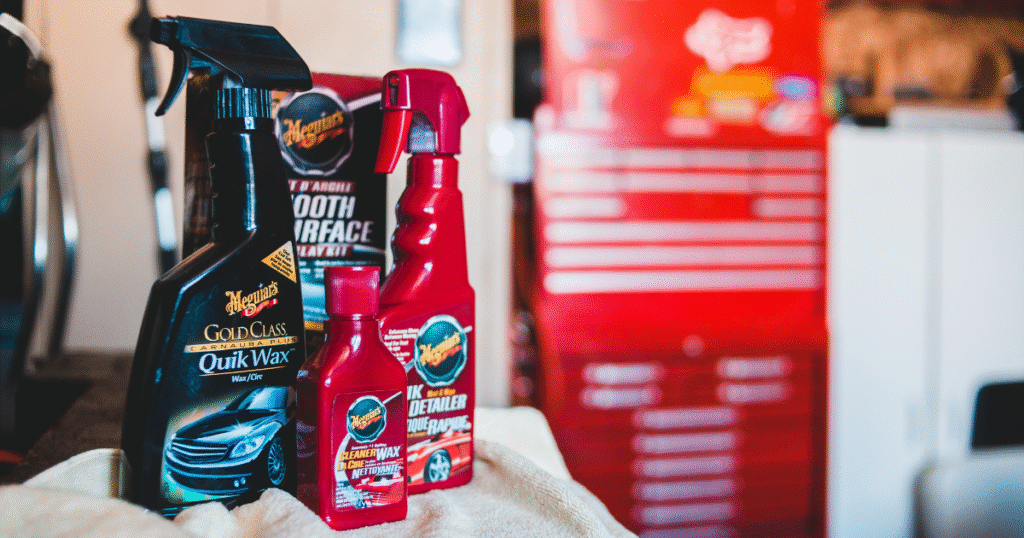
Basic mobile valeting essentials
If you have a limited budget, the most basic essentials include a pressure washer, water tank, sponges, buckets, and simple products like car shampoo, glass cleaner, and all-purpose cleaner. You’ll also need either a car or a van that’s large enough to transport the goods. These are the most basic essentials to offer entry-level services like exterior washes, interior valets, or mini valets.
Premium mobile valeting equipment
If you have more funds to play with, or if you want to offer advanced services like deep cleaning or full valets, you’ll also need a decent vacuum, steam cleaner, and air dryer, as well as some additional cleaning supplies like brushes and microfiber clothes. The amount of supplies you need will depend on the services and packages you want to offer.
That said, you don’t need the full kit if you’re just starting out. In fact, it’s best to start with your own car and the basic essentials, until you get some customers. You can gradually add more services or packages as your valeting business grows.
Where to buy mobile valeting supplies
When buying large equipment for your mobile valeting business, you have a few options. You can buy them brand-new from big name suppliers, or you can purchase them second-hand from sites like Gumtree and eBay, or even local car boot sales. This includes pressure washers, vacuums, air dryers, and steam cleaners.
In some cases, you can purchase starter kits or existing mobile valeting businesses with all the gear including a van. Although, getting the basics when just starting out is fine.
For cleaning products and chemicals, which need to be purchased regularly, it’s recommended to use a dedicated supplier like Ultimate Finish or Slim’s Detailing.
There are dozens of companies that specialise in supplying goods to mobile valeters and detailers, so it’s important to shop around and find the right match. You may want a company that offers fast shipping or is local to your area, so you can easily top-up supplies when needed.
Step Six: Get insurance
- Public liability insurance is strongly recommended to cover injury or damage, starting at around £5/month.
- Consider motor trade insurance for driving customer vehicles, plus equipment and employer’s liability cover if needed.
- Compare tailored quotes from providers like Simply Business or comparison sites to find the best match.
- Proper insurance protects your business and builds customer trust.
Insurance is a must when running a car valeting business. While it’s not a legal requirement in the UK, it’s highly recommended to get Public Liability Insurance which starts from as little as £5/month. This will protect you if your business or products cause any injury or damage.
You will also need Motor Trade Risk Insurance if you want to drive customer vehicles, Equipment and Stock insurance to protect your tools, and Employer’s Liability Insurance if you have employees.
Companies like Simply Business specialise in providing affordable insurance for small businesses, including public liability insurance for mobile valeters. You can choose the level of cover you need and compare tailored quotes in minutes. Alternatively, you can search for other providers on Google, or use a comparison site like Compare the Market.
Getting the right insurance not only protects you as a business, but it shows customers that you’re a trusted professional.
Step Seven: Start marketing
- Create a logo: Use free logo makers or hire a freelancer to create a professional, scalable design for vans, social pages, and marketing materials.
- Build an online presence: Set up Facebook, Instagram, and X pages, post regular content, and consider YouTube or TikTok videos. Run local Facebook ads to reach more customers.
- Launch a website: Use drag-and-drop website builders or hire a company to create a website to showcase your prices, work, reviews, service areas, and contact details.
- Join online directories: Add your business to directories like Yelp and Yell, and mobile valeting platforms like FreshWheels.
- Offline marketing: Distribute flyers, use billboards or community noticeboards, run local radio ads, and partner with nearby business for cross-promotion.
- Run sales and offers: Offer introductory discounts or freebies to win early customers and encourage repeat bookings.
Make a logo
You’ve secure a name for your business, now it’s time to create a professional logo. Thankfully, with advancements in technology, it’s relatively easy to craft a logo. There are tons of free logo makers that let you create a stunning design, even if you have no experience. You can use the logo for your website, social pages, and marketing materials.
If you want something a bit more unique and scalable for things like van wrapping, or if you just don’t have the time to create a logo, you can hire a graphic design company or a freelancer. Fiverr is a great place to get a professional logo made on a budget.
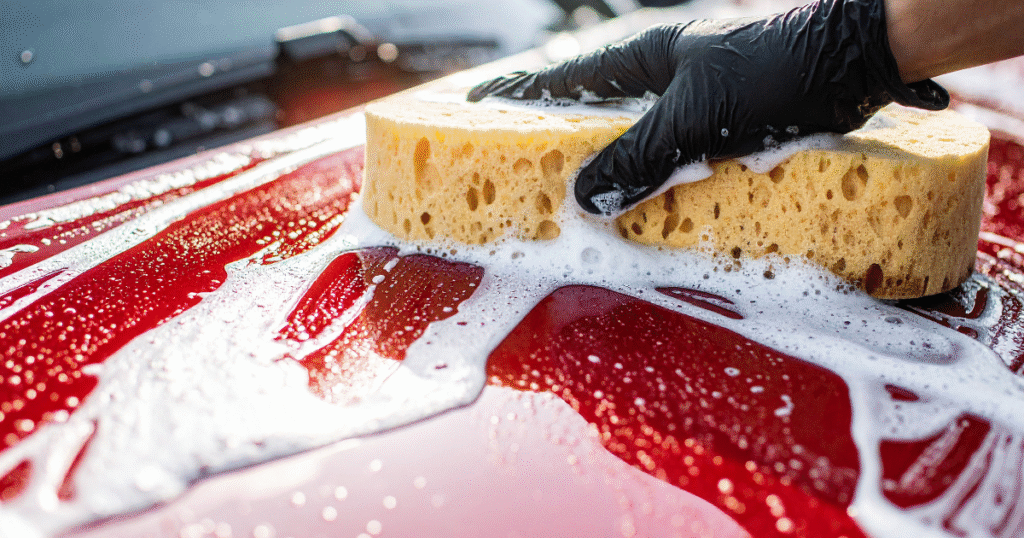
Create social pages
Whether it’s searching directly or asking friends for recommendations, millions of people use social media to find businesses online. Facebook alone has more than 55 million users in the UK, which is around 79% of the total population.
If you want to be found on social media, you need to create pages on popular platforms like Facebook, Instagram, and X (Twitter). It only takes a few minutes to set up a profile and some basic information.
To grow your followers, create regular posts and ask family and friends to share your page. Upload images or videos of completed jobs, run exclusive sales and promotions, highlight your key selling points, and share hints and tips about car care. The more active your pages, the more likely people will discover them when searching on Facebook.
If you have the budget, consider running paid ads to quickly build followers. Facebook ads are highly effective for promoting local businesses to a targeted audience. There are countless YouTube videos and guides on how to run Facebook ads effectively.
Talking of YouTube, consider making your own videos and uploading them to YouTube, as well as your social pages and apps like TikTok. This is one of the best ways to market your business for free. Think of SpudBros and the millions of followers they gained posting content on TikTok. All you need is a phone with a decent camera and a bit of creativity.
Build a website
A website is the best way to grow your brand and help customers find your business online. It’s also a powerful tool for showcasing your work and sharing important information about your business such as prices, reviews, service areas, and opening times.
Online website builders
These days, drag-and-drop website builders make it easy for anyone to launch a professional website. A lot of them are free to use or offer low-cost packages to get your business online quickly. AI website builders are also becoming increasingly popular for small businesses.
Freelancers or web design companies
If you don’t have the patience to build a website, you can hire a freelancer or web design company. Freelancers are often cheaper and can be found using platforms like Upwork or PeoplePerHour.
It will take some time an effort, but having a website will give you an advantage over competitors, and make it easier for customers to find you when searching for mobile valeters on Google.

Get listed in directories
Online directories like Yelp and Yell get millions of visitors each month and dominate search engines. It’s free to create a listing on both platforms and it only takes a few minutes.
Join valeting platforms
Mobile valeting platforms can help you reach more customers and get your business out there quickly. Here at FreshWheels, we offer a free to use directory that connects customers with mobile valeters.
After submitting a listing, customers in your area will be able to find your business. Include photos, a description, and details about your services and prices to make your profile more appealing and increase clicks and leads. It’s like Yelp, but focussed entirely on mobile valeting.
Try offline advertising
For local businesses, offline advertising is still one of the best ways to gain new customers. In fact, studies show that people are growing tired of digital ads, with 70% of consumers saying they trust printed material more than online promotions. While online marketing is still a must, using offline methods as part of your overall campaign will drive better results.
Flyers and leaflets
Flyers are a low-cost and effective way to market your mobile valeting business. Over £230 million was spent on leaflet distribution in the UK in 2017, with around 78% of consumers glancing at them, and 23% reading them completely.
You can easily design a professional flyer using tools like Canva and print them through services such as VistaPrint or InstantPrint. Prices often start at around £20 for 50 flyers, and bulk orders can bring the cost down further, sometimes as low as 5p per flyer for 1000 copies, depending on the size and paper weight.
To save money, you can hand-deliver the flyers yourself around your local area, or use Royal Mail’s Door Drop service. Costs vary by volume and weight, but as a guide, you’ll pay roughly £40-£70 for Royal Mail to distribute 1,000 flyers to households in a chosen postcode area.
Other companies such as Leafletdrop offer similar distribution services, and many will also handle the design and printing for you, making the process even easier.
Billboards and banners
Billboards are another powerful form of offline advertising. Whether you’re in a large city or a small town, a quick Google search will help you find companies that offer billboard advertising on trucks, at the roadside, or in bus stops, train stations, airports, or even phone boxes. Most billboard advertising companies can also help with creating the banners to get the best results.
Community noticeboards
Many people check noticeboards to find services in their area, making them a simple but proven way to promote your mobile valeting business. Pinning up a clear, eye-catching flyer can reach neighbours who might not be active online. Place them in community centres, supermarkets, and gyms to catch the attention of drivers who live or work nearby.
Radio advertising
If you have the budget, advertising on the radio is a leading way to attract new customers. In fact, studies show that radio campaigns generate a strong return on investment, around £7.70 for every £1 spent. A carefully made ad on your local radio station is sure to produce results for your mobile valeting business.
Partner with local businesses
Another effective way to reach more customers is by partnering with local businesses. Reach out to companies in your city and ask them if they would be interested in a collaboration.
Whether it’s a sponsored blog post, exchanging flyers, or offering services to compliment another product, there are many opportunities to partner with nearby companies.
As a mobile valeter, you can even contact local gyms, office blocks, cinemas, restaurants, or anywhere people park cars for extended periods of time. Negotiate exclusive deals to offer their customers a discount for washing their cars while their out shopping or watching a movie.
Run sales and promotions
If you’re new to the mobile valeting space, running sales and promotions is a great way to attract new customers. You can offer limited-time only prices, exclusive prices for introductory customers, or give away freebies and provide extras for cheap.
The goal is to get those first few customers as quickly as possible, even if it means operating at a low profit or a small loss, as it will help you to spread word of mouth, get positive reviews, and work exmples.
Keep in mind, many people who book mobile valeting services do so regularly. This creates strong potential to build a loyal, repeat customer base. Even if you earn a little less on the first job by running a promotion, the long-term value of that customer can be far greater.
Step Eight: Get reviews
- Ask customers for reviews on social media, Trustpilot, and valeting platforms.
- Offer small incentives like a discount or free add-on to thank them.
- Early positive reviews help build trust and show your reliability.
- Good feedback attracts new clients and encourages repeat business.
Reviews help build trust with customers, Make an effort to encourage customers to leave reviews for your business on social media, websites like Trustpilot, and valeting platforms like ours.
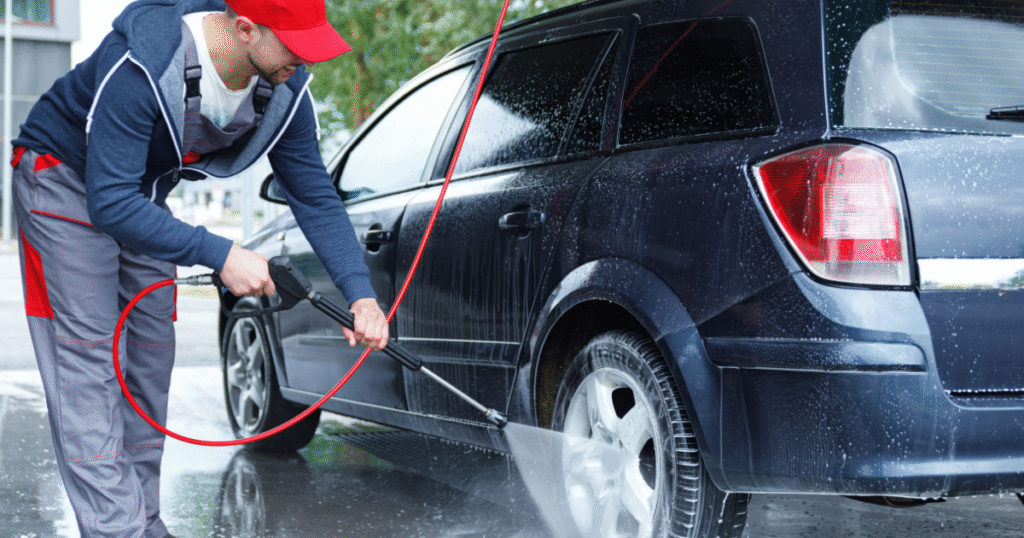
The best way to do this is by offering the customer a discount on a future booking, or by giving them a freebie. It doesn’t need to be anything major, a free extra like air freshening, tyre dressing, or boot vacuuming is enough.
Getting reviews is particularly important when you’re just starting out. It shows customer satisfaction and encourages more business, which grows over time as you gain more positive feedback.
Step Nine: Build a portfolio
- Take photos or videos of completed jobs to showcase your work.
- Share content on social media and a dedicated page on your website.
- Regularly update your gallery to promote your business and build trust.
- Showing examples demonstrates experience and professionalism.
Mobile valeting is a business where showcasing your work is as important as getting reviews. When you complete a job, take photos or make a video and share it on social media. If you have a website, upload the content to a dedicated ‘My Work’, ‘Gallery’, or ‘Portfolio’ page.
Keep growing your gallery as you get more jobs. This will help to promote your mobile valeting business and encourage new customers, as it shows them that you’re an experienced professional.
Step Ten: Manage the business
- Provide excellent customer service by communicating clearly, being punctual, and delivering high-quality work.
- Handle complaints quickly with solutions and goodwill gestures like freebies or exras.
- Keep accurate records of sales, expenses, and receipts for tax purposes using spreadsheets, software, or an accountant.
- Schdule booking efficiently, allowing enough time for each job and travel between appointments.
When you start getting a steady flow of customers, it’s important to manage the business correctly. Your success largely depends on how well you deal with customers, track sales and profits, and keep costs and expenses low.
Provide excellent customer service
If you want to establish a loyal customer base and a good reputation, providing excellent customer service is a must. To do this, make sure you communicate with customers clearly, turn up on time, complete the job to a high-standard, and always remain professional, even in challenging situations.
Also, you should handle any complaints swiftly. This means rectifying the issue, making suggestions for improvements of your service, and offering a freebie or extra as a goodwill gesture. Not all customers will be easy to deal with. However, good customer service can change the opinion of even the most difficult customer.
Practice good record-keeping
As a mobile valeter, you must keep accurate records of your business activity, such as sales logs, purchase receipts, and expense details. You’ll need these to file a tax return and pay any tax owed each year.
You can track everything using a simple Excel spreadsheet or you can use accounting software like Xero or Clear Books. Alternatively, you can hire an accountant and send them your bank statements and receipts so they can handle the records for you.
Whatever method you choose, set it up before you start making purchases or accepting payments. It will save you from having to scramble to find old receipts or chase missing records when deadlines approach.
Schedule bookings efficiently
One of the challenges with running a mobile valeting business is scheduling bookings and managing your calendar efficiently. Give yourself plenty of time to complete jobs and remember to include the time to travel between locations.
Step Eleven: Stay motivated and consistent
- Consistency is the key to long-term success in mobile valeting.
- Work on your business daily, even when results aren’t immediate.
- Develop self-discipline and stay motivated during the tough early stages.
- Persistent effort will help you break into the growing mobile valeting market.
In the words of Dwayne Johnson, “Success isn’t always about greatness. It’s about consistency. Consistent hard work leads to success. Greatness will come.”
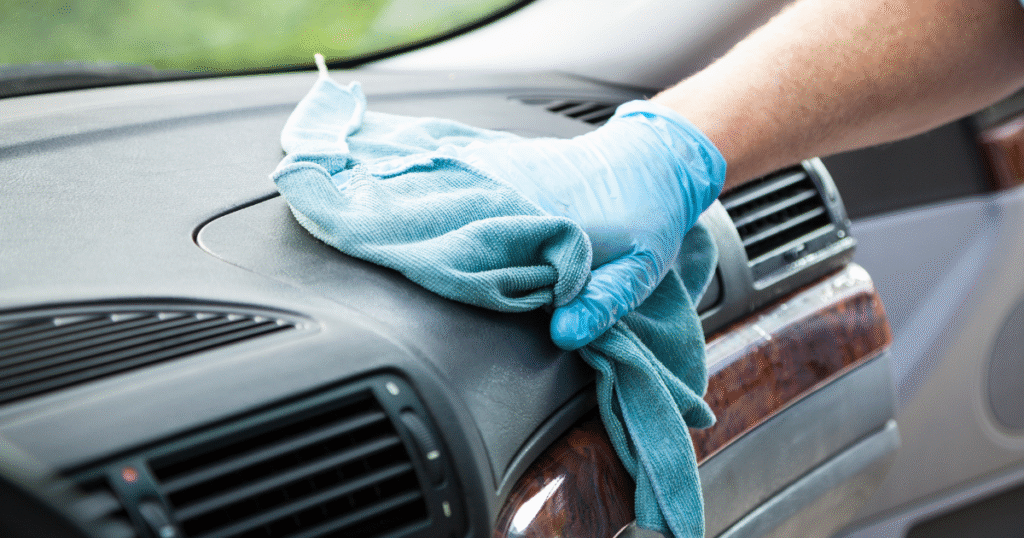
Whether you’re a mobile valeting newbie or a seasoned pro, consistency is the key to long-term success. Make the effort to keep working on your business every day, even when results aren’t immediate.
Learn self-discipline and harness techniques to stay motivation, especially during tough times, which are often experienced in the early stages of starting a business.
It’s not going to be easy. It’s not going to be quick. But, if you stay consistent and keep putting in the effort, success will follow. The market for mobile valeting is there and the demand is growing. It’s up to you to break into that market and make a name for yourself.
Conclusion
Starting a mobile valeting business is no easy task. It can be stressful and time-consuming, more so if it’s your first business venture.
From creating a business plan to picking a brand name, sourcing equipment, and learning how to market the business, this guide has given you a clear blueprint to success.
If you follow these steps, remain patient and stay motivated and consistent, you’ll quickly be on your way to becoming a top mobile valeter in your area.

